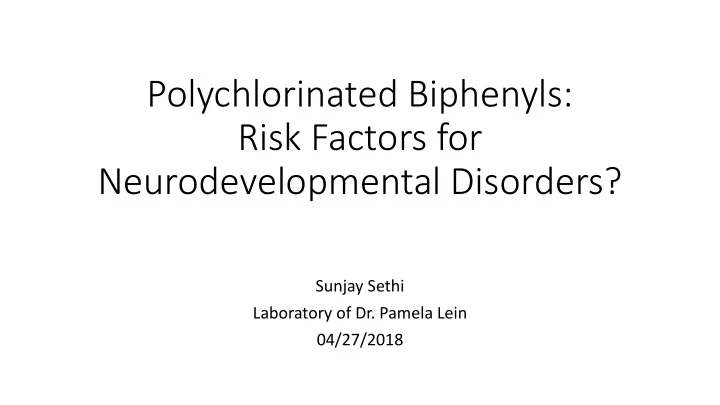

Polychlorinated Biphenyls: Risk Factors for Neurodevelopmental Disorders? Sunjay Sethi Laboratory of Dr. Pamela Lein 04/27/2018
What Are Polychlorinated Biphenyls? • PCBs are a class of persistent organic pollutants • Used in industry from 1920s until their ban in the late 1970s • High chemical stability and low flammability • Mainly used for electrical insulation as heat dissipater • Half life of decades
Polychlorinated Biphenyls (PCBs) • 209 possible congeners depending on placement of chlorines and degree of chlorination
PCB Exposure • Although they are banned they are still ubiquitous in our environment • Detectable levels in various human tissues and in women and children Mitchell et al (2012) Environ Mol Mutagen 53(8):589-98 Marek et al (2013) Environ Sci Technol 47(7):3353-61
PCBs And Neurodevelopment • Weight of evidence suggests that PCBs are developmental neurotoxicants • Multiple epidemiologic cohorts world wide have linked higher PCB exposure in utero with poorer cognitive function in adolescence Tatsuta et al (2014) Environ Res 133:321-6 Stewart et al (2008) Environ Health Perspect 116(10):1416-22
PCBs And Neurodevelopmental Disorders • Recently studies have shown that PCBs may also be risk factors for neurodevelopmental disorders (NDDs) such as Autism Spectrum Disorder (ASD) and Attention Deficit Hyperactivity Disorder (ADHD) Lyall et al (2017) Environ Health Perspect 125(3):474-80 Sagiv et al (2010) Am J Epidemiol 171(5):593-601
Ultrasonic Vocalizations - Communication • Mice will emit vocalizations in the ultrasonic range that can be picked up by sensitive equipment. • Pup is removed from cage and placed into chamber for 3 minutes. Number of calls is recorded.
Self Grooming – Repetitive Behavior • Empty cage • 10 minute habituation phase • 10 minute testing phase • Higher levels of grooming are signs of repetitive behavior
Automated Social Approach 1)Ten minutes in center chamber (doors closed) 2)Ten minutes with access to all chambers (doors open) 3)Ten minutes with novel object and novel mouse (doors open)
Acknowledgements Pamela Lein Funding Birgit Puschner NIEHS Grants ES014901 Kim Keil ES013661 Michelle (Jan) Guignet T32 ES007059 Hao Chen Floyd and Mary Schwall Fellowship Donald Bruun Suren Bandara Suang Supasai Lauren Matelski Keri Hayakawa Cameron Flayer Emma Karey Xiaopeng Chen Gary Wayman Hans-Jaochim Lehmler The rest of the Lein Lab!
Recommend
More recommend